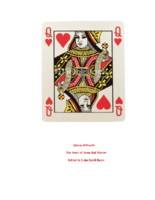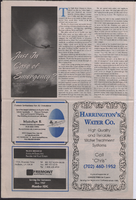Search the Special Collections and Archives Portal
Search Results
University of Nevada, Las Vegas Department of Anthropology and Ethnic Studies Records
Identifier
Abstract
The collection is comprised of the University of Nevada, Las Vegas (UNLV) Department of Anthropology and Ethnic Studies administrative records, memoranda, and correspondence dating from 1966 to 2006. The collection includes information about UNLV's department of Anthropology and Ethnic Studies from its inception at Nevada Southern University, its transition to UNLV, and research initiatives the department has undertaken.
Archival Collection
University of Nevada, Las Vegas Alumni Association Records
Identifier
Abstract
The University of Nevada, Las Vegas (UNLV) Alumni Association Records (approximately 1970-2009) primarily contain photographic prints of homecoming, graduation, award ceremonies, luncheons, career days, sports, and other events. Also included in the collection are photographic prints of UNLV merchandise, faculty, staff, students, and alumni, as well as subject files with correspondence, reports, brochures, university anniversary planning documents, promotional materials, meeting minutes, and newspaper clippings. Additional materials include contact sheets, negatives, a floppy disk, VHS tapes, a Betacam tape, and keychains.
Archival Collection
University of Nevada, Las Vegas Faculty Senate Records
Identifier
Abstract
The University of Nevada, Las Vegas (UNLV) Faculty Senate Records (1957-2001) primarily contain meeting agendas, minutes, correspondence, notices, and additional documents pertaining to the Nevada Southern University Faculty Senate and the UNLV Faculty Senate, as well as associated committees such as the Curriculum Committee, Graduate Program Evaluation Committee, and Status of Women Committee. The collection also includes constitutions, bylaws, handbooks, merit allocation lists, and reports.
Archival Collection
Morton "Mort" Saiger Portraits and News Articles
Identifier
Abstract
The Morton "Mort" Saiger Portraits and News Articles (1960-1987) consists of four newspaper and journal articles about Saiger and the Last Frontier Hotel Casino, two professional photographic portraits of Saiger, and a presentation plaque from the International Golf Club.
Archival Collection
Southern Nevada Historical Society Records
Identifier
Abstract
The Southern Nevada Historical Society Records document the management and development of the Southern Nevada Historical Society (SNHS) as well as various historical projects in Las Vegas and Southern Nevada that the society sponsored from 1948 to 1983. The records include SNHS correspondence (1951-1978), meeting minutes (1958-1983), and accounting information (1959-1980). It also contains copies of the SNHS Backtrails Newsletter, promotional material for events, membership lists, and research materials for various projects related to the history of southern Nevada and Las Vegas.
Archival Collection

Transcript of interview with Anna Sipl Meyers by Leita Kaldi Davis, February 12, 2012, February 29, 2012, March 27, 2012, April 6, 2012, April 24, 2012, May 3, 2012, May 9, 2012, May 16, 2012, October 19, 2012, November 16, 2012, & December 7, 2012
Date
Archival Collection
Description
From concentration to ownership of Las Vegas casinos, Meyers owned the Cashbah and the and Queen of Hearts in downtown Las Vegas. Interview dates: 2/12/2012, 2/29/2012, 3/27/2012, 4/16/2012, 4/24/2012, 5/3/2012, 5/9/2012, 5/16/2012, 10/19/2012, 11/16/2012, 12/7/2012.
Text

Interview with Kenneth Giles, February 10, 2005
Date
Archival Collection
Description
Text

Mariteresa Rivera-Rogers oral history interview: transcript
Date
Archival Collection
Description
Oral history interview with Mariteresa Rivera-Rogers conducted by Maribel Estrada Calderón on October 24, 2018 for the Latinx Voices of Southern Nevada Oral History Project. In this interview, Mariteresa discusses her early life in Concepción, Chile. She talks about her experience moving to Las Vegas, Nevada in 1965, the immigration process at the time, and becoming a Spanish language court interpreter. Rivera-Rogers recalls enrolling at the University of Nevada, Las Vegas' (UNLV) Sam Boyd School of Law, and her involvement with the Latino Bar Association. Lastly, Rivera-Rodgers discusses the challenges in translating Spanish language to English.
Text

Transcript of interview with Helen Naugle by Irene Rostine, October 31, 1996
Date
Archival Collection
Description
Prior to 1962, Helen Naugle had only visited Las Vegas once in her life while traveling from Idaho to California for a vacation with her husband and her boss. The group made a quick stop so her boss could interview for a position with EG&G and, as fate would have it, EG&G did not hire Helen’s boss. However, they did extend a job offer to Helen’s husband. A month later, Helen, her two daughters, and her husband became residents of Las Vegas, Nevada. Before moving to Nevada, Helen enjoyed singing in super clubs and performing on her radio show, “Melodies from Meadowland” and working for American Machine and Foundry. Upon her arrival in Las Vegas, Helen went to work for Bonanza Airlines before attending real estate school. In 1963, Helen opened her first office, Bruce Realty, and in 1965, she obtained her Broker’s license. She spent the next ten years selling general real estate. During this period, Helen was an active member of the Board of Realtors, as well as an early participant in the Board’s newly formed Women’s Council. Fate would strike again in Helen’s life while she was visiting her daughter at college in Arizona where she read an article in the Phoenix newspaper about a group of brokers who had formed a networking association to sell hotels and motels across the country. As a result of her initial contact with this association, Helen spent the next four decades selling hotels and motels throughout the State of Nevada, including Las Vegas, Elko, Tonopah, and Wells. She eventually became the first woman President of the American National Hotel-Motel Association. The cultural diversity of hotel and motel buyers would provide Helen with opportunities to travel the world and work with buyers from many different countries and cultural backgrounds. It also led to Helen’s membership in the FIABCI (International Real Estate Federation) and her Certified International Property Specialist and Federation of International Property Consultants certifications. Helen was also selected by the Association to represent the Air Force as “Innkeeper Evaluator” for one year. This honor took her to five Air Force bases in the United States and to Clark Air Force Base in the Philippines. During Helen’s career in hotel and motel real estate sales, she witnessed the transition from “mom-and-pop” American buyers to the influx of international buyers predominately from East India and Asia. The opportunities for helping repeat buyers and sellers gradually went away, as foreign buyers entered the market and tended to resell their properties to friends and family members from their own countries. During the latter part of her career, Helen found time to give back to the Las Vegas community through her volunteer work helping to establish the Scleroderma Foundation of Nevada. She also served on the Board of Directors of the Downtown Las Vegas Partnership where she focused on public safety in the area encompassing the Fremont Street Experience. Her work with both of these organizations allowed her to draw on her career experience for the benefit of others. Whether it was fate, or as Helen put it, she “just lucked into a lot of things,” one thing is certain - Helen Naugle was certainly a trail blazer for women in the hotel-motel niche of the real estate business, not only in Nevada, but across the nation.
Text

